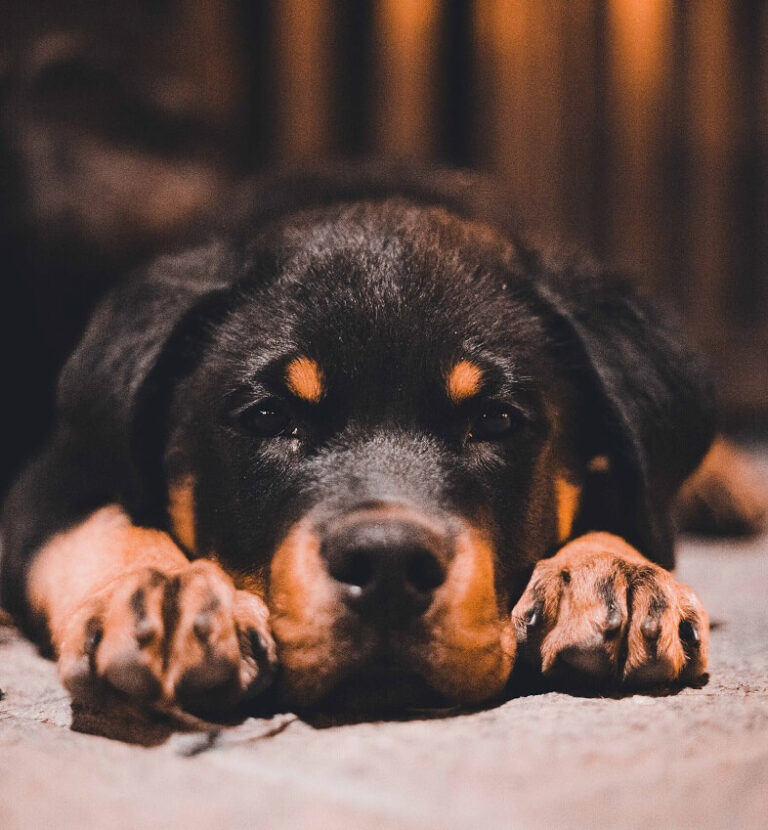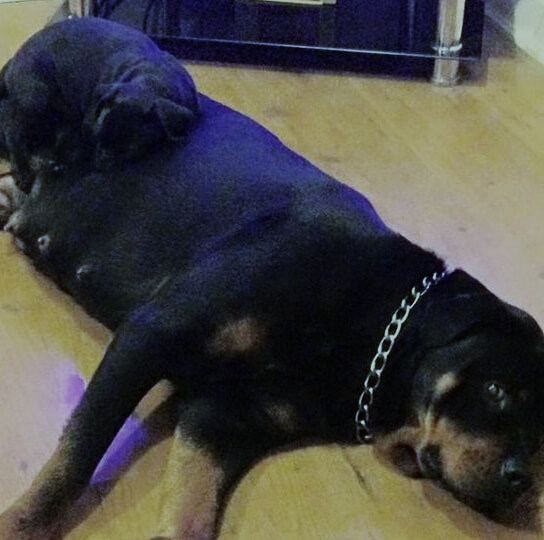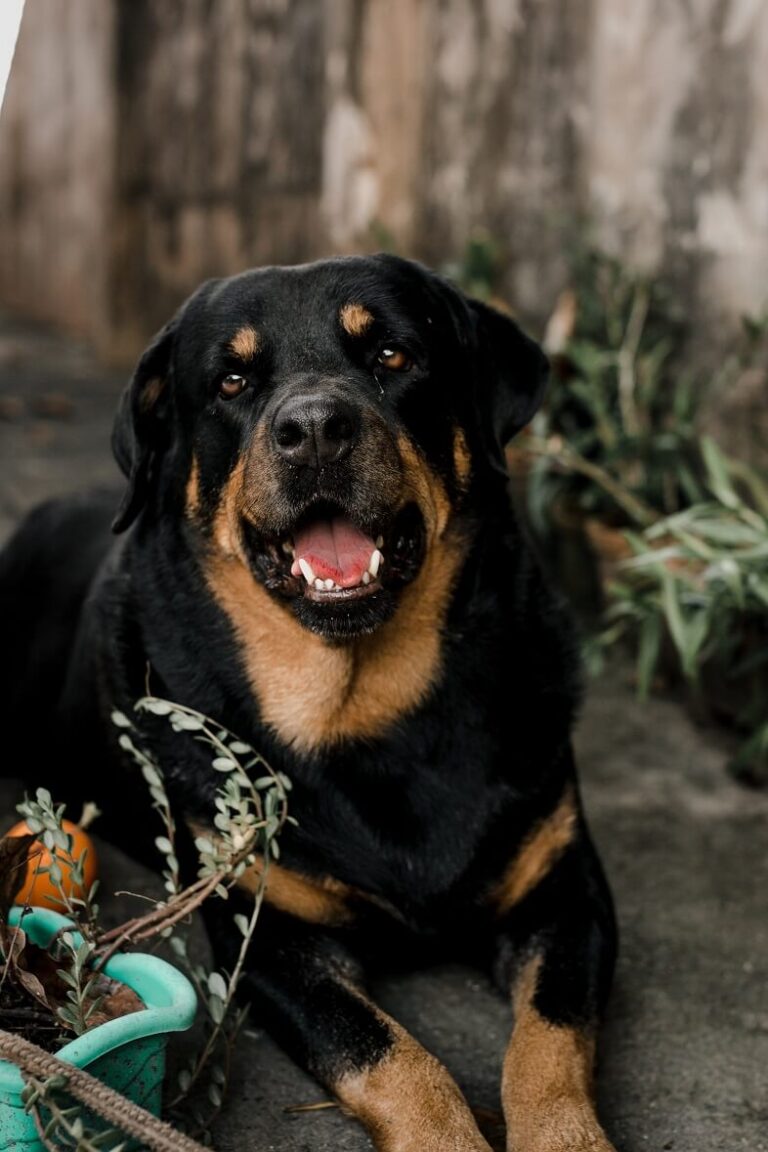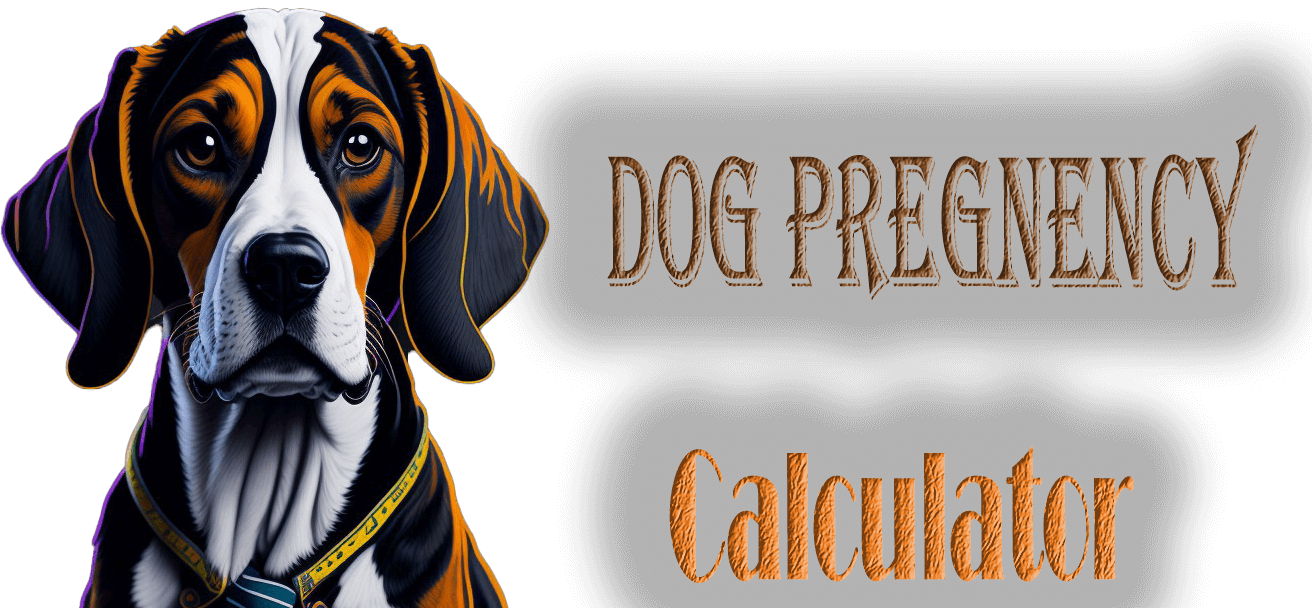Understanding Rottweiler Pregnancy and Gestation Periods
Welcome to our thorough explanation on Rottweiler pregnancy! It’s critical to comprehend the particular needs of your female pup at this exciting period as a responsible owner or breeder. By becoming knowledgeable about the various facets of Rottweiler gestation, you may provide excellent care and encourage a successful conclusion for the mother and her offspring. Our objective is to dispel any myths about one of life’s most intriguing phases in addition to offering useful information.
Table of Contents
ToggleFirst visit home page to calculate due date just by clicking here:
Adult females experience a three-week “heat” cycle around every six months. Smell marking, mounting behavior, and swelling vulvae are used during this period to attract mates, which may draw unwelcome attention from male canines. Unless you intend to conduct a controlled mating under the supervision of responsible individuals, it is imperative to keep your Rottie away from other dogs.

Signs of a Rottweiler Pregnancy
Knowing the signs and symptoms of pregnancy is crucial if you own a Rottweiler and believe she might be pregnant. The indicators of a pregnant Rottweiler that you should watch out for are covered in this article.
Physical Signs of Rottweiler Pregnancy
A bloated tummy is the most evident indication when a Rottweiler is pregnant. However, until a few weeks have passed, this is not a trustworthy sign of pregnancy. Among the additional physical indicators of pregnancy you could observe are:
- Enlarged Nipples: Your Rottweiler’s nipples will grow larger and perhaps deepen in color as the pregnancy goes on.
- Increased hunger: Because their bodies need more nutrients to support producing puppies, pregnant Rottweilers may have an increase in hunger.
- Behavior Modifications: You might notice that your Rottweiler is acting more affectionately or acting strangely, like being moody or restless.
- Vomiting and Nausea: Rottweilers who are pregnant and have morning sickness may vomit or feel ill to their stomachs.
- Nesting Behavior: Your Rottweiler may start to engage in nesting behavior as the due date draws near, such as digging or looking for a peaceful, cozy area to give birth

Medical Signs of Rottweiler Pregnancy
It’s crucial to take your Rottweiler to the doctor for a checkup if you think she might be pregnant. To confirm the Rottweiler pregnancy and figure out how many puppies are expected, have your veterinarian do an ultrasound or x-ray. Additionally, your veterinarian can keep an eye on your dog’s wellbeing throughout the pregnancy and offer advice on how to take care of her.
Rottweiler Pregnancy week by week
Weeks 1-3: The fertilized eggs will go to the uterus at this time and start to embed themselves into the uterine lining. Pregnancy may be difficult to detect at this time.
Week 4: The embryos will start to take on recognizable shapes and sizes. Lethargy, appetite loss, or moderate morning sickness could all affect the mother.
Week 5: The organs of the puppies will start to form while the embryos continue to grow. The woman may start to put on weight and her tummy may start to swell.
Week 6: The puppies’ skeletons will start to form, and an ultrasound can be used to confirm their sex. During this time, the mother might require more food.
Week 7: The puppies’ fur will start to grow and their eyes will start to form. The mother could become more agitated and uneasy.
Week 8: The puppies will be fully formed and the mother may start to produce milk. It is important to prepare for the upcoming labor and delivery during this time.
Stages in Rottweiler Pregnancy
Early Pregnancy: Your Rottweiler may display symptoms including nausea and vomiting, loss of appetite, and behavioral changes at this time.
The belly of your Rottweiler will notably increase during this stage of pregnancy as the puppies develop. Additionally, you might sense the puppies moving within the uterus.
Late Pregnancy: As the pregnancy nears its end, your Rottweiler will start building a nest and getting ready for the birth of her babies. As the puppies get ready to be born, you might also notice milk dripping from her nipples.

Caring for a Rottweiler pregnancy
Nutrition for Rottweiler Pregnancy
During pregnancy, proper nutrition is essential for the mother’s and the puppies’ health. A high-quality food that is filled in protein, vitamins, and minerals is necessary for pregnant Rottweilers. Due to the higher quantities of nutrients and calories in puppy chow, you might also think about feeding your dog during pregnancy. It is crucial to go through the dog’s food with your veterinarian to make sure it fulfills all of their unique requirements.
Exercise during Rottweiler Pregnancy
While it is essential for pregnant Rottweilers to remain active, it is important to avoid overexertion. Walking and gentle playtime are typically safe activities, but you should avoid any strenuous exercise or activities that could result in injury.
Veterinary Care
To make sure the mother and puppies are healthy during pregnancy, frequent veterinary examinations are essential. Your dog’s weight, heart rate, and other vital signs will be monitored by your veterinarian to make sure everything is going according to plan.
Rottweiler pregnancy whelping and delivery
A strategy for the delivery of the puppies must be in place. Creating a cozy environment for the mother and puppies is part of this, as is having all of the equipment on available, such as clean towels, scissors, and umbilical cord clamps. Additionally, you ought to know how to get in touch with an emergency veterinarian.
Stages of Delivery
- Panting, restlessness, and nesting behavior are the hallmarks of the first stage. Up to 24 hours may pass at this period.
- The actual delivery of the puppies takes place during the second stage. One puppy will be born at a time as the mother starts to push. This stage can endure for a short while or several hours.
- The third stage involves the delivery of the afterbirth, which typically occurs within 30 minutes of the birth of the last puppy.
Rottweiler Pregnancy Postpartum Care
Caring for newborn baby
Puppies that have just been born require a lot of care and consideration, and it’s crucial to make sure they’re fed, clothed, and kept warm. To make sure the puppies are gaining weight, you should weigh them frequently. You should also keep an eye out for any symptoms of illness or suffering.
Caring for the mother
After giving birth, the mother may need extra attention and care because she might be exhausted and hurting. Continue feeding her a high-quality food and keep an eye out for any indications of complications like mastitis or eclampsia.

Rottweiler Pregnancy Potential Complications
Dystocia
Dystocia, which is characterized by difficult or protracted labor, can be fatal for both the mother and the puppies. A puppy being stuck in the birth canal, prolonged straining without a litter, or signs of suffering in the mother or puppies are all indications of dystocia. Seek immediate veterinary care if you believe your Rottweiler is suffering from dystocia.
Mastitis
Mastitis, an inflammation of the mammary glands, can strike dogs that are nursing. Mastitis symptoms include irregular milk production as well as swelling, redness, and pain in the mammary glands. It is crucial to get veterinarian care if you feel that your Rottweiler is suffering from mastitis since, if ignored, it can result in a dangerous illness.
Eclampsia
Eclampsia—also referred to as milk fever—occurs when the mother’s calcium levels go too low. Restlessness, panting, muscle tremors, and convulsions are all indications of eclampsia. If your Rottweiler appears to be suffering from eclampsia, it is crucial to get them medical attention right away because this disease can be fatal if ignored.
Frequently Asked Questions
Rottweilers typically have litters of 6 to 8 puppies, but they can have up to 12 puppies in a litter.
It is recommended to start preparing for your Rottweiler’s pregnancy several weeks before breeding.
It is recommended to wait at least 12 months before breeding your Rottweiler again.
No, it is not recommended to spay your Rottweiler while she is pregnant. This can be dangerous for both the mother and the puppies.
If you suspect that your Rottweiler is experiencing complications, it is important to seek veterinary care immediately. Delaying treatment can be life-threatening for both the mother and the puppies.
- Nesting behavior
- Loss of appetite
- Enlarged abdomen
- Swollen nipples
- Increased lethargy
- Vomiting
- Mood changes
The average length of a Rottweiler pregnancy, like most dog breeds, is around 63 days or 9 weeks. However, the actual length of pregnancy can vary slightly depending on factors such as the individual dog’s gestation period, the number of puppies in the litter, and the timing of mating. It’s important to note that determining the exact due date of a Rottweiler’s pregnancy can be challenging, so it’s best to use the dog pregnancy calculator .
Rottweiler pregnancy complications include:
Miscarriage: Rottweilers, like all dogs, can experience a miscarriage or spontaneous abortion, which is the loss of pregnancy before the puppies are fully developed.
Eclampsia: This is a condition that can occur during or after pregnancy, in which the mother dog develops low blood calcium levels. This can lead to seizures, muscle tremors, and other serious health problems.
Prolapsed uterus: This occurs when the uterus protrudes from the vagina, usually during delivery. This is a serious emergency that requires immediate veterinary attention.
Dystocia: This is a difficult or prolonged labor that can result in fetal distress, maternal exhaustion, or even death if not addressed promptly.
Pyometra: This is a bacterial infection of the uterus that can occur after pregnancy. It can cause fever, lethargy, and other symptoms, and can be life-threatening if left untreated.
C-section complications: In some cases, a Rottweiler may require a caesarean section (C-section) to safely deliver her puppies. However, this surgical procedure does carry risks, such as infection, bleeding, and complications with anesthesia.
Preparing for a Rottweiler’s pregnancy can help ensure a smooth and healthy pregnancy for both the mother and her puppies, which include:
- Schedule a pre-pregnancy checkup
- Provide a healthy diet
- Ensure proper exercise
- Prepare a safe and comfortable whelping area
- Purchase necessary supplies
- Plan for veterinary care
- Research potential complications
A Rottweiler pregnancy typically lasts around 9 weeks or 63 days. This is similar to the average pregnancy length for most dog breeds, although there can be some variation between individual dogs.

